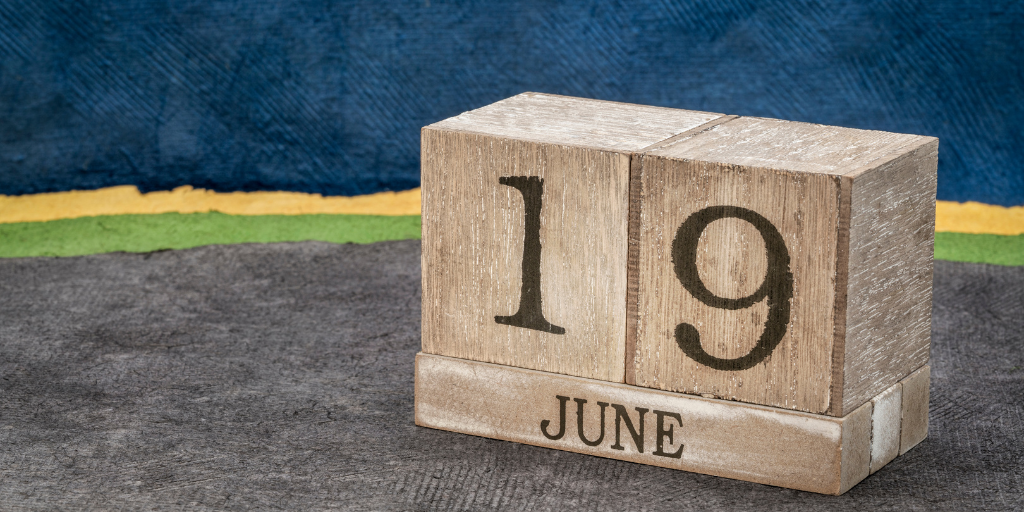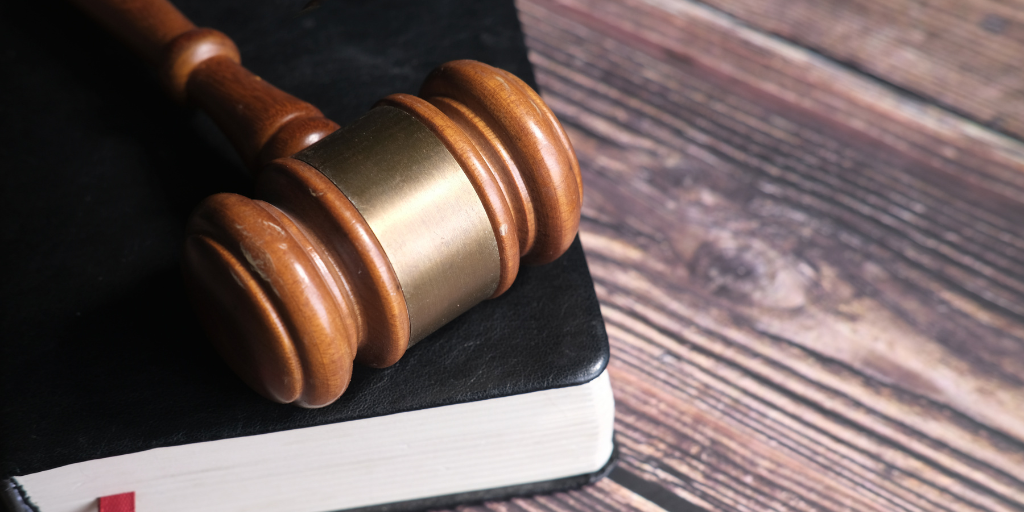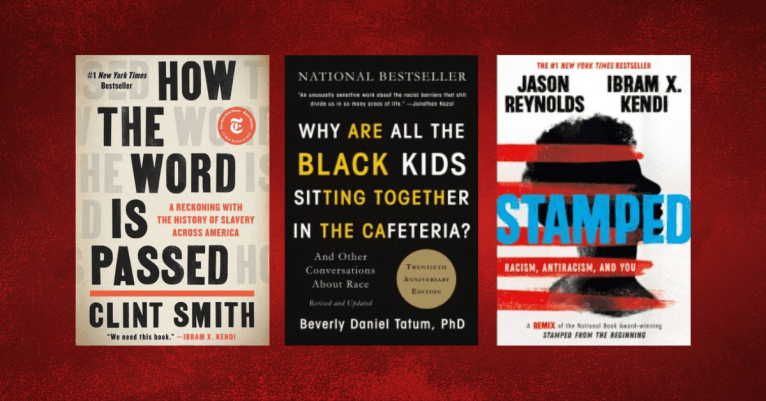Learn About the History and Celebrations of Juneteenth
Juneteenth (short for “June Nineteenth”) marks the day when federal troops arrived in Galveston, Texas in 1865 to take control of the state and ensure that all enslaved people be freed. In 1866, freedmen in Texas organized the first celebration of “Jubilee Day” on June 19. In the following decades, Juneteenth commemorations featured music, barbecues, prayer services, and other activities, and as Black people migrated from Texas to other parts of the country the Juneteenth tradition spread.

What is Juneteenth?
We all love a good holiday. These special days bring together friends and family, allow space for remembrance and ritual, and create a sense of community solidarity. Holidays allow us to pause and reflect, celebrating what’s truly significant in our otherwise hectic days.
However, not all celebrations gain the recognition they merit. Juneteenth, which marks the active end of slavery in the United States, stands testament to a critical moment in America’s history yet goes largely unknown and underappreciated a century after its founding. President Joe Biden marked Juneteenth a federal holiday last year following the nationwide protests of Black American killings.
What is the significance of Juneteenth, and how can it rise to the prominence it deserves?

Juneteenth’s Origins
On April 9, 1865, Confederate general and leader Robert E. Lee formally surrendered to Union troops at the Appomattox Courthouse in northern Virginia. This surrender would mark the beginning of the end of America’s tumultuous four-year Civil War.
The war-torn and disjointed southern half of the country did not hear of the event right away. It took until June of 1865 for the most rural areas of the country, like Texas and states west of the Mississippi River, to receive the information and surrender.
As Union troops moved to occupy defeated southern states, they took with them executive and general orders—official announcements on the terms of occupation and the transition of seceded states back into the union.
One of these general orders came on June 19. In the island town of Galveston, Texas—located just off the state’s southeast coast—Union Major-General Gordan Granger publicly read General Orders No. 3 to the crowd. He announced the immediate and effective emancipation of about 250,000 remaining enslaved people. The orders also established that the owner/slave dynamic that existed before and during the war would now be employer/employee—and for all labor to be compensated with wages.
Though the officially recognized “end” of the Civil War occurred two weeks earlier, on June 2, 1865—and the Emancipation Proclamation went into effect two years before then in January 1863—June 19 was selected to celebrate the actual end of slavery. On that day in 1865, legal emancipation per General Granger’s order reached some of the farthest corners of the country, and African Americans saw a complete, legal release from slavery. For many, it was a first glimpse of freedom, amends, and hope.

Juneteenth’s Significance
Juneteenth honors the legal end of slavery, not a political strategy like that which inspired the Emancipation Proclamation in 1863. The original intent of Abraham Lincoln’s Emancipation Proclamation was to preserve the Union and weaken the South—rather than take a moral position on slavery. It took until the Thirteenth Amendment’s passing in April 1865 to seal a complete, legal, and constitutional abolishment of slave ownership, then several weeks more for word of abolishment to spread throughout the country.
Though many obstacles, injustices, and hardships would continue to face Black communities—and linger even today—Juneteenth marks the earliest promise of justice.
The freed people of Texas were the first to establish Juneteenth as a holiday. Its inaugural celebration occurred in 1866, soon spreading to neighboring states like Oklahoma, Louisiana, Arkansas, Florida, and even California.
Newly freed African Americans purchased plots of “emancipation land” where they could commune and celebrate at a time when discriminatory laws prohibited people of color from gathering in places like city parks. Together, these purchases established landmarks in areas around Texas—like Houston’s Emancipation Park, Mexia’s Booker T. Washington Park, and East Austin’s Emancipation Park, all of which still exist today.

Common Celebrations of Juneteenth
Celebrating Juneteenth is about remembering the past, honoring today’s progress, and looking toward a better future. Many Juneteenth celebrations do so through a variety of traditions.
1. Readings of the Emancipation Proclamation
The Emancipation Proclamation represents a pivotal moment in American history, regardless of the motivations behind it. It was one of the first times a human-rights cause was championed on an executive scale, and it offered an undeniable stepping-stone to the passing of the Thirteenth Amendment in 1865.
Few people know that the Emancipation Proclamation was issued twice. The first reading, on September 22, 1862, served as Lincoln’s original attempt to convince Confederate states to rejoin the Union. Without slaves, he reasoned, the South’s economy would collapse, thus forcing them to abandon their rebellion.
When no Confederate states surrendered, Lincoln signed the Proclamation into effect on January 1, 1863. It was a controversial move, even by today’s standards. Lincoln lacked actual power to exercise the Proclamation since it applied to states outside of his current governing territory. It was considered a risky war strategy and demonstration of executive war powers.
Even though the Proclamation was unenforceable, it started a momentous shift in the fabric of America’s moral tapestry. Today, it is widely considered one of the country’s most important historical documents.
2. Readings of Prominent Black Writers
Black writers have made a substantial mark on the literary world in every genre, from Black Poet Laureates to award-winning sci-fi novels.
Juneteenth represents a perfect day to honor the contributions of Maya Angelou, Ralph Ellison, Langston Hughes, Alice Walker, James Baldwin, and countless other Black authors, celebrating the artistic and creative endeavors of Black Americans.
These writers and their works acknowledge an important piece of American history, thus promoting the spirit of Juneteenth. With specific periods in Black cultural history especially fertile for literature, including the Harlem Renaissance (1920-1940) and the Black Arts Movement (1965-1975), reading the work of prominent Black writers is a good way to celebrate the holiday.
Related: Explore More Antiracism Reading Lists
3. Religious Sermons and Spirituals
The importance of religious life has continued through generations within some Black communitites. Southern traditions seen in gospel music, spirituals, and impassioned sermons have made their way into contemporary American life and beyond.
Religious spirituals, or Freedom Songs, and sermon-inspired speeches are common when celebrating Juneteenth. They include harmonies of celebrated spirituals like “This Little Light of Mine” and “Lift Every Voice and Sing,” reflect on the horrors of slavery and the promise of liberation.
Prayer services and sermons during Juneteenth act as avenues for self-expression and connection through transcendent words and song.
4. Cookouts
Food is an essential part of most holidays, and Juneteenth is no exception. The history of American barbecue and African techniques, traditional Juneteenth barbecues pay homage to low-and-slow cooking and seasoning methods. Pitmasters, or the designated barbecue experts elevating barbecue into an art, tend a Juneteenth festival’s central barbecue pit.
5. Parades and Street Fairs
Many major U.S. cities host Juneteenth parades or street fairs put together by local organizations, nonprofits, or governments. They are celebratory and vibrant events for a community to come together and remember this pivotal point in American history.
Some cities even offer educational and civil engagement opportunities, with many utilizing the spirit of Juneteenth to herald further community involvement with civil rights issues.

The Obstacles Against Juneteenth
The celebration of Juneteenth has faced many legal and cultural obstacles that, at times, have made it difficult for Black communities to congregate safely. But the holiday lives on, making these celebrations an important part of what it means to remember America’s past and work toward a better future.
Widespread acknowledgement of Juneteenth has faced many obstacles, including historical legal impediments and the country’s limited historical awareness of the day.
1. Legal Impediments
Since the founding of the United States, many demographic groups have faced exclusion from the promise of social equality. While the country touted itself as a haven for democracy, freedom, and individual rights, it originally granted those rights to a select few. The history of America is, therefore, a history of expanding and redefining its core social promise, one that’s inclusive and equally opportune for all.
A series of “Black Codes” put into effect after the Civil War restricted the civil and economic opportunities of newly freed African Americans. These codes created impediments to receiving building or festival permits, congregate during certain hours, and live, work, or engage in social activities in certain neighborhoods. Black Codes were a fundamental reason behind many African Americans purchasing emancipation plots in order to hold Juneteenth festivities since they could not gather safely in most city parks.
Later on, the Jim Crow laws that governed the South through the 1960s provided another heinous example of a lack of equity in the United States. Under Jim Crow laws, social spaces like parks and libraries as well as public institutions such as hospitals and schools forced segregation. Black schools, offices, and cemeteries were separately run and poorly funded. Rules and restrictions existed for public transportation and harsh laws and guidelines on the interactions between white and Black southern Americans were enforced, with consequences typically for Black “offenders” only.
These laws were explicitly discriminatory and marginalizing. They were designed to limit, repress, or make difficult the daily actions and liberties many of us take for granted today—like holding a festival. Those who dared to challenge Black Codes or Jim Crow laws were often met with threats, violence, and death, with few resources to seek justice.
In remembering Juneteenth, we rally around a day where community and resilience can shine. Even amongst the blatant public accommodation hardships enacted by Jim Crow and the Black Codes, Black people banded together to ensure they had a place to celebrate.
2. Limited Awareness
Juneteenth’s significance remains relatively unknown throughout the United States. This could be for several reasons, including:
- Not Taught in Schools: Nearly every school across the nation will discuss the Fourth of July, the Declaration of Independence, the U.S. Constitution, the American Civil War, and the Emancipation Proclamation. They will cover various aspects of slavery and the 20th-century’s Civil Rights Movement. But few will delve into the actual timeline of slavery’s abolishment. Juneteenth is lost in this educational gap.
- Not Religiously Affiliated: Many recognized national days of observance—both for public and private institutions—center around religious holidays. These tend to be Christian-affiliated holidays that hold legal protection, with time off from work to practice related traditions. Juneteenth holds no such affiliation and is not legally protected.
- Not an Officially Recognized National Holiday: Though not a federal holiday, 47 states and the District of Columbia recognize Juneteenth as a ceremonial holiday. The only three states that do not recognize the holiday are North Dakota, South Dakota, and Hawaii. and partially staffed, unpaid government day..

Juneteenth Today
The past three decades have seen a resurgence in the celebrations and significance of Juneteenth. Juneteenth is also referred to as Freedom Day or Juneteenth Independence Day, although the language “Independence Day” continues to be a source of discussion. For many Black Americans, Juneteenth—and not the Fourth of July’s Independence Day—serves as the day to commemorate a real hope for an equal future.
In 1980, Texas became the first state to make Juneteenth an official state holiday. This meant—for the first time in American history—that a state held a day dedicated solely to the emancipation of slavery and the beginning reconciliation of Black Americans as citizens.
Other states soon followed. Contemporary Juneteenth celebrations now take place in more than 40 states and the District of Columbia, with events falling on June 19 and its nearest weekend.
The largest Juneteenth celebration still occurs in its place of origin: Galveston, Texas. Yet the holiday reaches other surprising locations. For example, Midwest cities like Minneapolis hold some of the nation’s largest and most festive Juneteenth celebrations annually.
Juneteenth celebrations traditionally take place in parks, museums, and community centers. Places like the Smithsonian and the Henry Ford Museum now host their own Juneteenth events, all with the mission to honor and promote Black history, culture, and legacy.
The Federal Holiday Movement for Juneteenth
Today, Juneteenth continues to grow in popularity due to a movement aiming to make it an officially recognized national day of observance, like Flag Day and Patriot Day.
The National Juneteenth Observance Foundation (NJOF), founded in 1997, serves to create nationwide Juneteenth recognition. The founder and chairman of NJOF, Reverend Ronald V. Myers, still champions the cause two decades after its founding.
NJOF’s work has led to Congressional hearings regarding the recognition of Juneteenth, as well as bipartisan action lending the holiday on a higher platform.
Locally, you can identify and follow the work of Juneteenth-advocacy groups in your area from NJOF’s organization registry and events calendar.

How to Celebrate Juneteenth: In Literature and Beyond
Celebrating Juneteenth means giving time and attention to a moment in history that continues to define American identity. It is as celebratory as it is reflective, with the potential to galvanize further social change. Memorializing Juneteenth doesn’t just occur in parades and barbecues. Understanding racism throughout all American history is an important way to mark the occasion.
There are hundreds of books addressing America’s racial past. While many don’t focus solely on Juneteenth, reading them allows an imperative racial dialogue to continue:
Reading books like these fulfills part of the mission and spirit of Juneteenth: to remember our history and use those lessons to effect positive change to our present and future.
Explore and learn more about this little-known holiday. Then share what you’ve learned with others so they can reflect upon this vital piece of history, both on and off the page.
Featured Post
